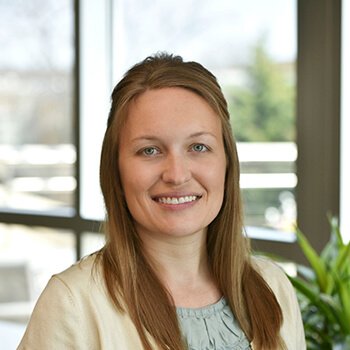
How do pharmacists make an impact on their patients? Read Beth DeJongh's story to find out more.
Pharmacists make an impact: Beth DeJongh’s story
Beth DeJongh, PharmD, BCPS, BCPP, is an Associate Professor of Pharmacy at Concordia University Wisconsin. Beth is able to have lasting impacts on her patients through her work in the field of mental health. Her teaching focuses on the coordination of a pharmacotherapy course, which includes the mental health and neurology units as well as coordination of a mental health elective.
Beth is active in her field through her service on the College of Psychiatric and Neurologic Pharmacist’s Recertification Editorial Board. She also participates in an interdisciplinary mental health court. Additionally, Beth provides education on psychotropic medications to police officers through Crisis Intervention Trainings. Read more about Beth’s path toward becoming a pharmacist.
Note: Beth’s responses are typed in italics.
Tell us a little about yourself.
Outside of being a mental health pharmacist and associate professor of pharmacy practice, I’m a wife and mother. I have three children: Gunnar (8), Kenlee (6), and Colbie (5). We have four dogs and three rabbits that add to the fun and chaos in our home! Between the three children, they are actively involved in hockey, gymnastics, downhill skiing, Cub Scouts, Girl Scouts, horseback riding, piano lessons, and our church service club. I’m a Girl Scout troop leader, and I run the youth service club at our church. My husband helps coach their hockey teams, so we are actively involved in all of the things our children are interested in! I love to travel and spend time outdoors hiking, kayaking, skiing, etc.
What made you want to become a pharmacist?
First of all, I knew I wanted to become a pharmacist after my grandfather was diagnosed with cancer. I wanted to help take care of patients and felt my natural abilities best aligned with pharmacy. I was intrigued by the medications and noticed how they could help but also cause pretty significant adverse effects. Ultimately, I felt I could make a difference in the lives of patients by better understanding their medications and providing appropriate education.
What area of pharmacy practice do you currently work in?
I have always worked as a mental health pharmacist. I practice as a Clinical Mental Health Pharmacy Specialist two days per week at the Clement J. Zablocki Veterans Affairs Medical Center in Milwaukee. I run a metabolic syndrome monitoring clinic for patients taking antipsychotics and also work with a psychiatrist in our clozapine clinic. Some of the antipsychotics can cause metabolic adverse effects, like weight gain, hyperglycemia, dyslipidemia, and hypertension.
Clozapine is a medication for treatment resistant schizophrenia and it is associated with several concerning adverse effects. I monitor for the adverse effects and make recommendations to help keep the patient on clozapine. This allows the psychiatrist to focus her appointment on the patient’s mental health, rather than using the entire appointment time to assess and manage adverse effects.
Can you tell us about a time when you felt like you really made a difference in the life of a patient?
I was working with a patient in my clozapine clinic and noticed she was having difficulty answering some of my questions due to confusion. There were also longer delays than normal in her response time. She grabbed something out of her purse and I noticed a tremor in her hand. In addition to clozapine, she was taking a medication called lithium.
Lithium is dosed based on blood levels and toxicity is a concern if the levels become too high. I decided to escort her to the emergency room and requested they check a lithium level. Her level came back in the toxic range and she was admitted to the hospital for further treatment. Her daughter recently took over management of her medications and helped ensure she took them each day.
Previously, the patient took the medications on her own and didn’t always take them as prescribed. Her lithium levels increased after her daughter took over the medication management because she was taking the lithium much more consistently. This was a good reminder about how much medication adherence can impact patients and to follow your instincts if you notice a change in a patient or think something is wrong.
What do you love about being a pharmacist? What do you love about teaching future pharmacists?
I love being a pharmacist because I can positively impact peoples’ health and lives. It is fulfilling to know I make a difference in the lives of others. I am only one person and when I am working in clinic there are a finite number of patients that I can directly impact. I love teaching future pharmacists because I can have a greater impact by adequately preparing them to take care of patients. Teaching exponentially increases the amount of people I can directly and indirectly help.
Do you want to know more?
Dr. DeJongh’s story is proof that pharmacists can have lasting impacts on their patients. If you’re interested in learning more about how you could make a difference through pharmacy, visit us here.
—
If this story has inspired you, why not explore how you can help further Concordia's mission through giving.